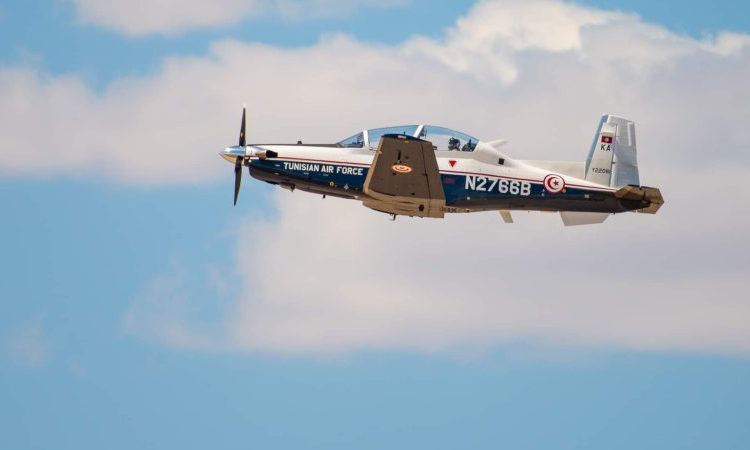Tunisian pilots have achieved a major milestone in their aviation careers as they recently completed an intensive one-month training program on the T-6C Texan II aircraft. The training took place at the renowned Beechcraft factory in Wichita, Kansas, USA, from March through to April 2023. The Tunisian Air Force can now boast a group of highly skilled pilots who have successfully completed the T-6 Initial Cadre Instructor Pilot Training, equipping them with invaluable expertise on the T-6C Texan II aircraft.
The comprehensive training program consisted of two distinct curricula: ground training and flight training. The ground training curriculum spanned over 112 hours, ensuring that the pilots gained a solid theoretical understanding of the T-6C Texan II. They were introduced to the general characteristics of the aircraft, including its flight controls, general handling, and aerobatics. Furthermore, the Tunisian pilots received extensive instruction on instrument flying, navigation techniques, night flying procedures, various types of formation flying, and flight evaluation methodologies. This rigorous theoretical instruction laid the foundation for the practical aspect of their training.
The flight training curriculum, comprising over 24 flying hours, allowed the Tunisian pilots to put their theoretical knowledge into practice. Under the guidance of experienced instructors, they honed their skills in handling the T-6C Texan II aircraft. The flight training sessions encompassed various aspects of piloting, including takeoffs, landings, manoeuvres, and emergency procedures. By logging extensive flight hours, the pilots gained valuable hands-on experience and developed a deep familiarity with the aircraft’s capabilities.
Last November, Textron Aviation Defense announced the delivery of the first Beechcraft T-6C Texan II Integrated Training System to the Tunisian Air Force in support of operations at No. 13 Squadron at Sfax Air Base in Tunisia. At the time, Tunisia was in dire need of new trainer aircraft to replace its ageing fleet and allow it to continue training pilots to support counter-terrorism and border security missions.
In November 2020, the Government of Tunisia requested a possible sale of twelve (12) T-6C Texan trainer aircraft, training, and spares from the United States at an estimated cost of $234 million.
In 2019, the Government of Tunisia requested a possible sale of twelve (12) T-6C Texan trainer aircraft from the United States to will replace Tunisia’s ageing trainer fleet and allow Tunisia to continue training pilots to support Tunisia’s counter-terrorism and border security missions. Tunisia will have no difficulty absorbing this aircraft into its armed forces.
The choice of the T-6C Texan II as the training aircraft is a testament to its versatility and reliability. This single-engine turboprop aircraft, manufactured by Beechcraft, is widely recognized for its advanced avionics and user-friendly design. It’s modern cockpit layout and sophisticated instrumentation make it an ideal platform for pilot training. The Tunisian Air Force’s decision to utilize the T-6C Texan II for their pilots’ training underscores their commitment to equipping their personnel with state-of-the-art equipment and ensuring the highest standards of aviation proficiency.
in 2021, the Pentagon revealed that the Air Force Life Cycle Management Center awarded a contract valued at USD12.5 million to Textron Aviation Defense to provide long-lead items to support the aircraft, in a contract valued at USD12.5 million. Subsequently, on June 30 the U.S. Department of Defense announced the contract for Tunisian Air Force T-6C training aircraft for a total of $106 million.
The successful completion of the T-6 Initial Cadre Instructor Pilot Training program marks an important milestone in the Tunisian Air Force’s efforts to enhance its operational capabilities. The newly trained pilots will play a crucial role in maintaining the readiness and effectiveness of Tunisia’s air power. Their proficiency in handling the T-6C Texan II will enable them to train future generations of Tunisian pilots, ensuring the continuity of a skilled and well-prepared aviation force.
This achievement also highlights the strong partnership between Tunisia and the United States in the field of aviation training. The collaboration between the Tunisian Air Force and Beechcraft, based in Wichita, Kansas, allowed for a seamless training experience at the renowned Beechcraft factory. The expertise and knowledge imparted by the instructors and the hands-on training received by the Tunisian pilots are a testament to the effectiveness of this partnership.
As Tunisia continues to modernize its armed forces, the successful completion of the T-6C Texan II training program is a significant step forward. The Tunisian Air Force can now rely on a cadre of highly trained pilots who possess the necessary skills and knowledge to uphold the highest standards of aviation excellence. The T-6C Texan II training program not only strengthens Tunisia’s defence capabilities but also deepens the bilateral relationship between Tunisia and the United States in the realm of military cooperation.
The Foreign Military Sales (FMS) contract comprises eight T-6C Texan II advanced military training aircraft, in-country field service and logistics support representatives, program management support, interim contractor support for the first year, training for pilots and maintenance professionals, spare engines, spare parts and aircraft support equipment.
The Beechcraft T-6C Texan II is designed and manufactured by Textron Aviation Defense LLC, a wholly owned subsidiary of Textron Aviation Inc., a Textron Inc. company.
Besides the T-6C trainer approval, the US government also approved four AT-6 Wolverine light attack versions of the aircraft for Tunisia in February 2020.
Both the T-6C and AT-6 share an 85% commonality in structure, avionics, and other systems, and are expected to replace the Tunisian Air Force’s (Al‐Quwwat al‐Jawwiya al‐Jamahiriyah At’Tunisia) fleet of Aero L-39 Albatros and SIAI-Marchetti SF 260 Warrior aircraft that have been in service since 1995 and 1974 respectively.



